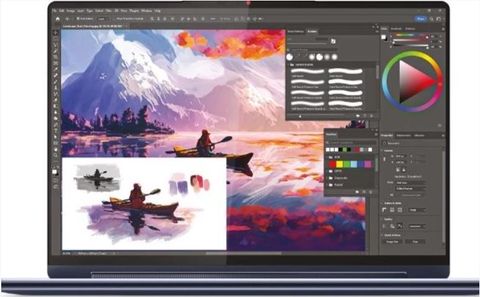Why you can trust TechRadar
This review first appeared in issue 360 of PC Pro.
While HP’s Elite x360 2-in-1 laptop would wear a bowler hat if it could, the Yoga 9i is a free spirit. It wants you to make art not presentations, to view films not spreadsheets, to sit in cafés not end-of-quarter sales meetings. That’s not to say it can’t look serious – if anything, the slim, dark blue metal chassis could be a funkier color – but it essentially screams entertainment.
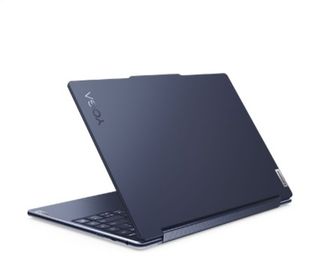
Let’s start with the 14in OLED panel. While it peaked at a modest 402cd/m2 in our SDR tests, its VESA TrueBlack 500 certification shows in punchy colors when watching films or playing games. It covers 119% of the DCI-P3 gamut and you can trust its colors, too, with an average Delta E of 0.45. The native color temperature is a fraction warm, so whites aren’t as blazing as I like when typing in Word, but a density of 242ppi thanks to its 2,880 x 1,800 resolution makes the edges of text look razor sharp.
Lenovo includes its Slim Pen stylus, which magnetically attaches to the top of the lid. I love the firmness of the connection, but it doesn’t charge at the same time; there’s a USB-C slot at the top of the pen. As ever when using a plastic tip on a glass surface you can’t expect a paper-like experience, but digital artists will appreciate the minimal 18ms lag, and the Smart Notes app is great for scribbles and sketches. At 1.3kg this isn’t an iPad rival, but I was happy holding it in the crook of my arm while doodling.
The keyboard is no ThinkPad in terms of “feel”, but there’s a generous 1.5mm of travel and the keys are large and easy to hit. Lenovo adds a bunch of shortcut keys on the right-hand side: eye-care mode, mute, a shortcut to its useful Vantage app for controlling settings, and a performance mode switcher.
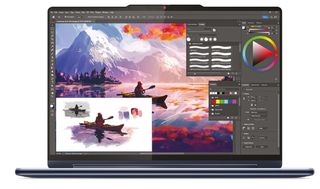
During benchmarking I opted for Lenovo’s high-performance mode, but don’t get too excited.
Intel’s Core Ultra 7 155H is a fine processor, but the Geekbench 6 scores printed below won’t concern AMD or Qualcomm, while its PCMark 10 score of 6,392 is strong but not incredible. Likewise a multicore result of 816 in Cinebench 2024.
Where Intel’s chip continues to beat Qualcomm is gaming, and there is potential here: 41fps in Dirt 5 at 1200p is a respectable return, as is 30fps at the screen’s native resolution, but you’ll need to find less demanding titles to benefit from the panel’s 120Hz refresh rate. I thoroughly enjoyed Dirt 5’s pumping soundtrack through the Yoga’s speakers, though, with far more bass than I’m used to from laptops. That’s thanks to a pair of 2W woofers in the base.
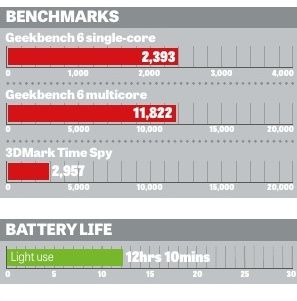
Unlike the ThinkPad T14s (see p56), the Yoga 9i isn’t designed for easy maintenance. The difficulty isn’t so much in getting inside the chassis – four Torx T5 screws offer little resistance – as what you can do once you’re there. It’s good to see QR codes to help identify components, but I would only feel confident replacing the M.2 SSD – a scorching 1TB unit that returned 6,197MB/sec sequential reads – and the 75Wh battery.
Two months ago, I would have been full of praise about this laptop’s battery life: 12hrs 40mins under light use is a fine result. Or it was, until Snapdragon-based chips almost doubled my expectations. Still, that’s enough to mean you don’t need to sling the 65W charger into your bag on the daily commute, and it recharges speedily: 41% in half an hour, 75% after an hour.
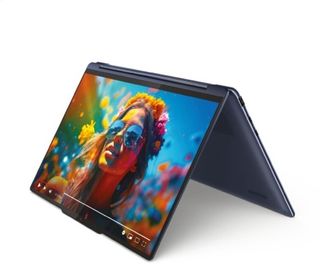
Lenovo is throwing in a couple of sweeteners. Use the part code 83AC000FUK and you’ll receive a swanky cover – complete with a loop for the stylus – and a three-in-one USB-C hub that adds USB-A, VGA and HDMI. These complement the three USB-C ports and one USB-A port tucked into the laptop’s narrow base (there’s a 3.5mm headphone jack, too). It’s a shame the hub doesn’t include an RJ45 port, and while I’m wishing it would also have been nice to see Wi-Fi 7 rather than Wi-Fi 6E. You can configure the Yoga 9i 2-in-1 Gen 9 on Lenovo’s website, with options such as 32GB of RAM, a higher-res screen and a grey finish rather than blue. But this pre-configured system is better value, especially as it was on sale for £1,500, a £200 discount, at the time of going to press. Still, I’m not convinced that’s bargain enough. Despite all the quality on show, the price feels like it should be closer to £1,300 to compete with the deluge of laptops currently appearing on shelves.
Tim Danton is editor-in-chief of PC Pro, the UK's biggest selling IT monthly magazine. He specialises in reviews of laptops, desktop PCs and monitors, and is also author of a book called The Computers That Made Britain.
You can contact Tim directly at [email protected].
What is a hands on review?
Hands on reviews' are a journalist's first impressions of a piece of kit based on spending some time with it. It may be just a few moments, or a few hours. The important thing is we have been able to play with it ourselves and can give you some sense of what it's like to use, even if it's only an embryonic view. For more information, see TechRadar's Reviews Guarantee.
